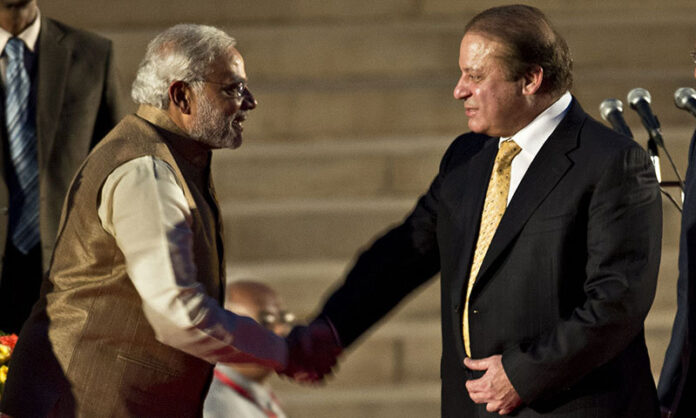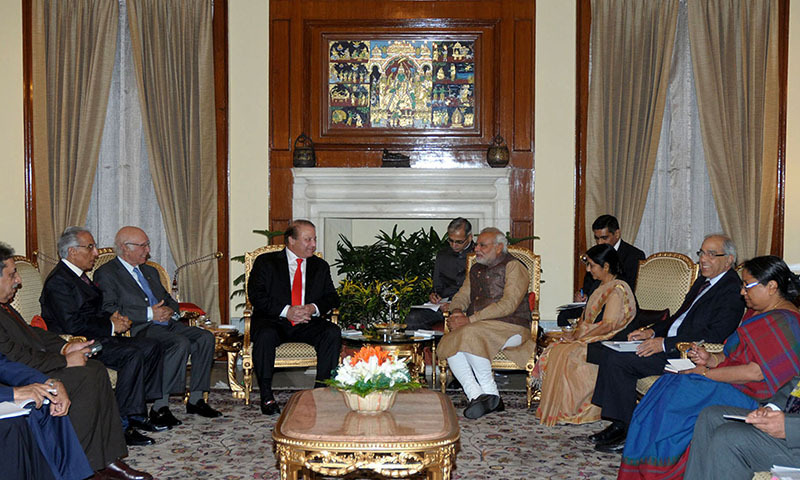
Evaluating the Nawaz-Modi summit, Indian Express commented: “while the Pakistani side appeared gung-ho and optimistic about the meeting, the Indian side was more realistic about its expectations and cautious about the outcome”. Evaluations in Pakistan are erratic varying over a broad spectrum ranging from sell-out to strategic victory. As realists, both Modi and Sharif probably do not expect any immediate breakthrough but only incremental progress; they will have to strive hard to change confrontation into cooperation.
In Pakistan, reaction to Nawaz Sharif’s visit to India is a mixed one—varying between sell-out to strategic victory. The model of “peaceful neighbourhood” is too theoretical and divorced from realities—especially in the context of India. In bilateral affairs it always takes two to tango. The gap between the Prime Minister’s wish and reality is dangerously high. While operating in such a void, Pakistan can only end up appeasing India. The people are disappointed that the Prime Minister preferred to meet Indian artists and ignored the All Parties Hurriyat Conference leadership.
Pakistan’s foreign policy outreach will continue to be influenced by the developments in the country’s internal security environment, prospects for economic recovery and improved governance. Progress on all challenges facing the country would be essential drivers for our future engagement in the region—especially India. Pakistan needs to watch developments within India with a new government in place. As of now India, enjoys a position of strength. Robust 7 percent economic growth for over a decade and favourable international image has infused a sense of misplaced super power hubris in India. Symbolics like Hindu extremists’ demand to ban the call for Morning Prayer (Azan-e-Fajr) are as relevant to the evolving environment as the fact that Indian defence spending is more than five times that of Pakistan’s. India is undertaking a massive force modernization and up-gradation programme costing US$ 120 billion, spread over a decade. Intoxicated by dangerous doctrinal concepts India is in no mood to cede space to Pakistan. Nawaz Sharif’s romanticization with the erstwhile Lahore Declaration is unrealistic because India is not even ready to restore Composite Dialogue in its original format which is the foundation rock of the Lahore Declaration.
Pakistan’s High Commissioner to India Mr. Abdul Basit was summoned to Islamabad to evaluate the impact of Prime Minister Nawaz Sharif’s recent visit to India. Mr. Basit had spent a lot of effort in preparing a favourable environment for the summit. However, wishes are not the horses on which statecraft could ride through. Pro-active approach warranted that impact should have been anticipated before the visit.
So far, both Modi and Sharif have shown a statesman-like approach. Modi has quickly shed his anti-Pakistan image of his campaign days and has emerged as a shrewd practitioner of real-politick. The leadership of the two countries has taken an unprecedented bold stand. Now they stand a better chance to normalize bilateral relations. They have ample time to mend ties. Both Modi and Sharif have taken the proverbial first step, however, one has to wait and see if they can take things to their logical conclusion—enduring peace. There is no quick fix to complex Pakistan-India bilateral ties.
Modi held talks with Sharif on a well thought out agenda and raised issues like cross-border terrorism, the Mumbai terror attacks trial and recent attack on the Indian consulate in the Afghan city of Heart. Reportedly, Modi told Sharif that terror attacks must stop; he delivered a blunt warning to Nawaz on his first day as PM.
Dispelling the impression that Modi had given a tough time to Nawaz, the Prime Minister’s Advisor on National Security and Foreign Affairs, Mr. Sartaj Aziz stated that: “There was clear recognition of each other’s concerns and the need for mechanisms to address them.” Aziz added: terrorism came up for discussion and Sharif told Modi it was a mutual concern and Pakistan had suffered enormously from this menace. “The people and government of Pakistan are serious and committed to fighting terrorism in their own national interest,” he said. Nawaz advised Modi to let the law take its course on the 26/11 Mumbai attacks. No assurances were asked for in this regard and none were given. Slow progress in the Samjhauta Express bombing case was also taken up during the meeting.
Although Sharif left no stone unturned to retain mantra of trade, business, shared legacies and a profitable future, he almost sidestepped historical predicaments. Rejecting the impression that Nawaz was “charge-sheeted” during his visit to India, Pakistan described the tour as reflective of “dignified diplomacy”, which “went “well beyond the expectations”.

Nawaz Sharif looked obsessed to drive an agenda of trade and economics. He told The Hindustan Times that: “I am regarded as a friend of businessmen and we are regarded as a business friendly government. Modi too is perceived as a business-friendly person. He has a model of development…“We can easily work with each other…I will be happy to have Indians invest in Pakistan. We have an acute shortage of energy. If Indians come, they will find Pakistani markets very attractive, with returns as high as 30 percent.”
Indian Foreign Secretary Sujatha Singh summed up the talks from the Indian perspective: “We want peaceful and friendly relations with Pakistan. However, for such relations to proceed, it is important that terror and violence is brought to an end…Prime Minister underlined our concerns related to terrorism… It was conveyed that Pakistan must abide by its commitments to prevent territory under its control for being used for terrorism against India”. Singh said Modi had told Sharif that the two countries could move towards normalization of trade on the basis of the September 2012 roadmap on political and economic relations. India presented its point of view on Jammu and Kashmir.
Modi stuck to a hawkish script instead of a more peaceable one. Though Sharif’s visit has set the ground for an improvement in relations, expectations of any substantive breakthroughs in immediate time frame are unrealistic. A calibrated measure of optimism is in order for modest progress, but there is need to be cagey of likely challenges as well. It does not mean that long standing issues such as Kashmir and the Pakistan-India rivalry in Afghanistan are about to disappear. Both sides should take into account historical ups and downs in the bilateral ties before formulating a fresh way forward. Both sides should focus on formulating policy that can withstand the echoes and shockwaves of history and the routine stresses of complex relationship.
Modi approached the talks with a clear understanding that he would not get into a discussion on the specifics of Pakistan’s demand on issues such as Kashmir or Siachen. Indian officials have also expressed satisfaction over the fact that Sharif did not meet the Hurriyat Conference leaders. In his talks with Modi, Sharif also didn’t directly take up the Kashmir issue. He told Modi that his government was willing to address all issues with India in the spirit of cooperation and sincerity.
The resulting impression is that Modi has clearly informed Pakistan of what he expects and Pakistan didn’t ask for anything. Be it Kashmir or issues concerning water, Pakistan was mute. There was absolutely no justification to mention the Mumbai incident on this occasion keeping in view the generous attitude demonstrated by Nawaz Sharif by taking the bold step of embarking on the Indian visit.
Pakistan’s India policy needs a reality check and bold course correction. At least in the short term timeframe, Pakistan hardly stands a chance to gain anything, beyond trivialities, out of bilateral dialogue with India. In its eagerness to bend backward for wishful outcome, Pakistan may, in the process, lose whatever leverage it has for quid pro quo.




